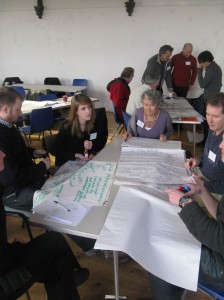24 Feb 2011
Transition Support Scotland’s Reskilling event
Here’s a short film about the Reskilling event that Transition Support Scotland ran at last year’s Big Tent festival.
Transition Culture has moved
I no longer blog on this site. You can now find me, my general blogs, and the work I am doing researching my forthcoming book on imagination, on my new blog.
Come find me at robhopkins.net
Showing results 86 - 90 of 183 for the category: Culture.
Here’s a short film about the Reskilling event that Transition Support Scotland ran at last year’s Big Tent festival.
I wrote a while ago about the wonderful event that was the Unleashing of Transition Malvern Hills. I mentioned that at the event they showed a 20 minute film, drawing together some of the different work underway in the area. That film is now online, and you can watch it below….
Dave Chapman works for BASSAC (the British Association of Settlements and Social Action Centres) and lives in Totnes, where he is active within the ATMOS Project. For the Ingredient of Transition being prepared for the forthcoming new Transition book on the Community Ownership of Assets I talked to Dave about community asset development and also about the ATMOS Project.
Why is the community ownership of assets important? Why does it matter that the community is able to own its own assets?
Self-determination, more than anything else. It’s about defining where you’re going to. Land ownership enables you to define where you take a community in the end, so it can come down to supporting energy use, food use, employment, housing – it’s the basis for the right mix within a community.
 Here is the first of two interviews I did recently for the new book, on the subject of the community ownership of assets. The second will be published tomorrow. Today’s is with Sara Neuff of Coin Street Community Builders, an amazing project I have written about here before.
Here is the first of two interviews I did recently for the new book, on the subject of the community ownership of assets. The second will be published tomorrow. Today’s is with Sara Neuff of Coin Street Community Builders, an amazing project I have written about here before.
So Sara, why is it important that communities own and run their own assets? Why does it matter?
The first response to that is that it in a sense depends upon the kind of asset and what it is you’re trying to achieve.
 From my experience of going to different events which promote the concept of social enterprise, it is clear that the idea that social enterprise can be used as a driver for decarbonisation and economic localisation is a very small but emergent part of the social enterprise ‘scene’. It was therefore timely and fascinating to spend 2 days in Totnes last week exploring, in a collaboration between Transition Network, Local United and Transition Town Totnes, the role social enterprise and entrepreneurship might play in building resilience at the local level.
From my experience of going to different events which promote the concept of social enterprise, it is clear that the idea that social enterprise can be used as a driver for decarbonisation and economic localisation is a very small but emergent part of the social enterprise ‘scene’. It was therefore timely and fascinating to spend 2 days in Totnes last week exploring, in a collaboration between Transition Network, Local United and Transition Town Totnes, the role social enterprise and entrepreneurship might play in building resilience at the local level.